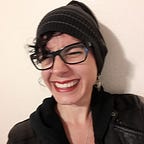Transformation Tools: Unlearning The Abuse of Power
This series of transformation tools are written by folks who have harmed others. These are tools they have developed while transforming the behaviors and societal factors that contributed to those harms. Their hard-won and freely offered wisdom is shared here anonymously, but with the writers’ full consent.
When I was in my early 20's I was in a situation where I was supervising and teaching a person who, while of consenting age, was far younger than me and under my purview to some extent. Below are some of the concrete questions and thought processes I use in order to help me not use my power or status to gain sexual relationships.
I learned that if I have to tell someone not to tell others about our relationship that is probably a sign that consent hasn’t been navigated as well as I would like. Of course, there have been times where keeping a relationship from others is essential to the safety of someone involved, or a relationship benefits from a low profile, however, I have found that if I feel it would damage my reputation, social capital, or get me in trouble in some way if others discovered my relationship, it needs a deeper thought.
I usually start by asking myself why I don’t want the relationship to be public. I think try to think through the consequences of making the relationship public and attempt to separate what might cause me harm to what might be a consequences of a harmful choice. For example, I may keep a queer relationship more private because I feel fear that due to my surroundings my relationship could put me in physical danger, but that is different from feeling fear that a relationship with my employee might put me in danger of being fired.
Sometimes when I ask myself these questions, I found it was easy for me to turn consequences into something that meant I would be harmed and therefore justify the secrecy. So in addition to thinking through these questions myself, I added another task: talking to a friend.
By asking a trusted friend to examine the situation and assess if my fear is based in a fear of harm towards myself or fear of having to face the consequences of my choice and to look for power inequities that I may have missed.
In the years since I caused that harm, I have found that these questions are really helpful in navigating the world and relationships, especially the ones that involve a power imbalance. It is my hope that by sharing them here, other folks might find them useful too.
